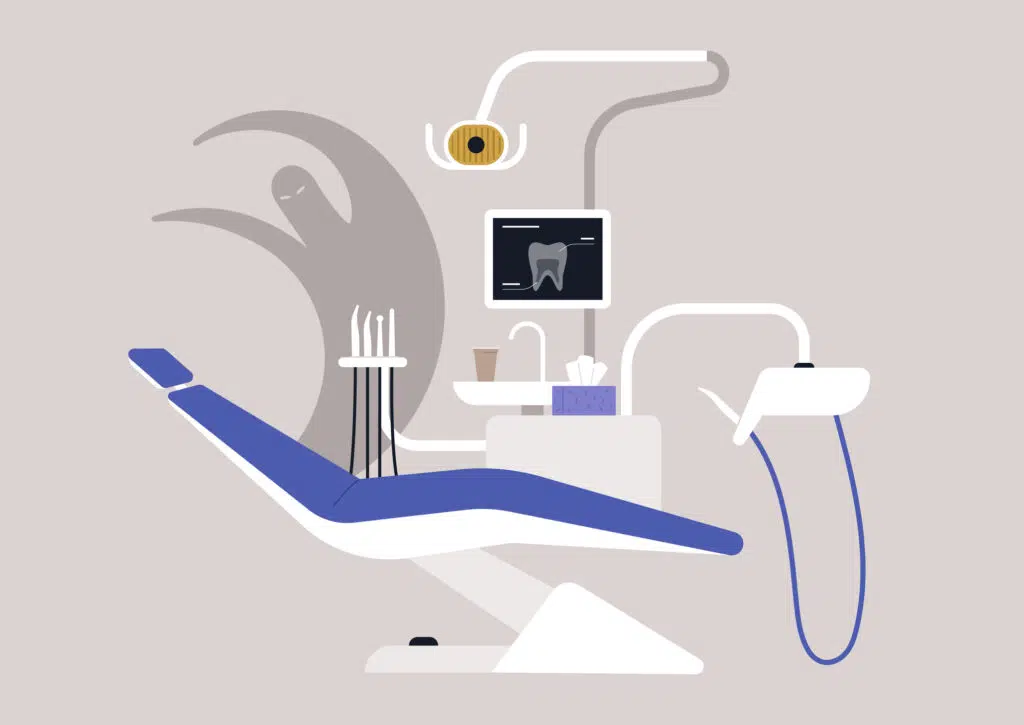Psychoanalysis for Phobias

There are about 19 million Americans with one or more phobias. While things like spiders, flying, and small spaces spring to mind when talking about phobias, you can develop a phobia around almost anything.
Read on to learn about phobias, psychoanalysis, and evidence-based therapies to conquer your fears.
What Causes Phobias?
A phobia is an intense and extreme fear of an object or situation. While phobias can bring a person to a standstill or freeze in the moment, there’s still much to learn about what causes them. Phobias are complex, and it’s believed that there can be a few different causes:
- A traumatic or bad experience associated with a specific object or situation.
- Watching someone else’s fear may lead to the development of a fear.
- Genetics may have a role to play.
- Brain chemistry and structure may influence phobias.
Some risk factors can increase your risk of developing specific phobias, like:
- Age
- Family members
- Bad experiences or learning about bad experiences
- Stress
- Temperament
A phobia can be caused by more than one factor. Although phobias often appear in childhood, you can develop a phobia over time at any point in your life.
How to Diagnose Extreme Fears or Phobias
In the Diagnostic and Statistical Manual of Mental Disorders, phobias are classed as an anxiety disorder. Phobias don’t always appear to make sense to the outside world, but the emotional and physical response can be unbearable for some.
Other anxiety disorders, like generalized anxiety disorder, involve more general and persistent anxiety in life. In comparison, phobias are specific and focused fear in response to an object or situation. People with phobias often avoid the situation or object in question.
For instance, someone who is fearful of flying may avoid getting on a flight to the point where they will miss important family events or work opportunities. They might have an overwhelming and intense fear of just the thought of flying.
To diagnose an extreme fear or phobia, an individual would speak with a mental health professional like a psychologist or psychiatrist, who would carry out an evaluation that may include the following:
- A mental health professional would ask about your symptoms and how they affect your daily life and try to understand more about any avoidance behaviors you have.
- They may ask about your physical symptoms like rapid heart rate and if you have anxiety or panic attacks.
A diagnosis of a phobia is based on specific criteria outlined in the Diagnostic and Statistical Manual of Mental Disorders (DSM-5), which includes:
- Intense fear of an object or situation
- Immediate fear when exposed to the fear trigger
- Unreasonable fear compared to the actual threat
- Avoidance or distress when facing the fear
- Significant impact on daily life
- Fear lasting at least 6 months
- Symptoms not explained by another condition
What is Psychoanalysis for Phobias?
In the 1950s, psychoanalysis was at the forefront of psychology. It was seen as a revolutionary way to unlock the secrets of the unconscious mind. Psychoanalysis, a therapeutic approach pioneered by Sigmund Freud, looks at phobias as something deep-rooted in the unconscious or stemming from repressed childhood experiences. The theory is that fear or anxiety is hidden in the unconscious mind.
Psychoanalysis offers a unique perspective on the origins of phobias, but it’s not the treatment approach that mental health professionals take today.
Other Treatment Options for Phobias
While psychoanalysis and Sigmund Freud’s discoveries still influence modern psychology, more evidence-based therapies are used now. Therapies such as CBT and exposure therapy are often the go-to treatments for specific phobias.
Talk Therapy
The best treatment for phobias is called exposure therapy, successfully treating up to 80-90% of those who finish treatment. Exposure therapy is a type of cognitive behavioral therapy (CBT) that helps individuals overcome their fear by gradually exposing them to their phobia in a very safe and controlled environment.
Other types of talk therapy can also be helpful for treating phobias, including:
- Cognitive Behavioral Therapy (CBT): CBT helps individuals to identify and address unhelpful thoughts and feelings associated with their phobia.
- Mindfulness Therapy: Mindfulness-based stress reduction is a CBT technique that helps to reduce anxiety and stress by improving emotional regulation.
- Virtual Reality Exposure Therapy (VRET): VRET uses the latest virtual reality technology to expose individuals to their phobia in a realistic yet controlled and safe environment.
Medicinal Solutions
In general, exposure therapy would be the first line of treatment for phobias, but there may be times when medication is recommended. Your doctor may recommend medications like beta-blockers and sedatives in short-term cases where you occasionally encounter your phobia.
Typically, medicines are prescribed when the symptoms of a phobia make it incredibly difficult to carry out everyday activities. A mental health professional can determine if medication is necessary and talk to you about what’s best for your individual case.
Lifestyle Adjustments
If you’re seeing a psychologist, they may recommend some lifestyle adjustments to help you cope and manage your anxiety, such as:
- Learn relaxation techniques like deep breathing, yoga, and progressive muscle relaxation.
- Mindfulness to help you reduce anxiety symptoms and lower avoidance behaviors.
- Regular exercise to help with stress and manage anxiety related to phobias.
Supporting Loved Ones with Phobias
Phobias can be debilitating and tough to deal with. Having a partner or loved one with a phobia can also be hard. While some phobias can make sense, it can be difficult to wrap your head around others. If you have a loved one with a phobia, try to understand phobias and take what they are saying seriously. Here are some ways to support a loved one with a phobia:
- Encourage them to seek help.
- Try to be patient and understanding.
- Don’t confront them to face their fears.
- Practice mindfulness and relaxation techniques together.
- Look after yourself and your needs.
While you can’t get rid of someone’s phobia for them, you can support and encourage them to get treatment. Learn about their triggers and the type of phobia they are dealing with. It can feel like facing your fears is a helpful motto, but this isn’t a useful approach for people with phobias. A therapist is trained in dealing with phobias and how to treat them effectively.
When to Contact Thriving Center of Psychology
It’s normal to hear that a friend is scared of spiders or maybe an aunt can’t stand snakes. But at what point should you speak to a mental health professional about your phobia? Here are some signs that you could benefit from speaking with a therapist:
- Your phobia significantly impacts your daily life.
- You experience overwhelming fear or anxiety when exposed to the phobia, even when you recognize that the fear is irrational.
- You do whatever it takes to avoid your phobia, even if it disrupts your life.
- You experience physical symptoms like rapid heartbeat, sweating, and trembling.
- You experience panic attacks.
If any of these symptoms sound familiar, it’s important to reach out for professional help. Know that most phobias are treatable, and you can overcome your fear with the right treatment and support.
At Thriving Center of Psych, our experienced therapists specialize in treating phobias and anxiety disorders. Through evidence-based therapies, we can help you overcome your fear and live a happier life. Contact us today to schedule a consultation.

Finding a Bilingual Therapist in New York City
a city where people speak over 200 different languages, finding a bilingual therapist in New York is more than a convenience – it can be a game-changer for mental health

The Link Between Social Media and Depression
In today’s world, scrolling through social media is as routine as brushing our teeth. We open apps out of habit — on the train, in bed, while waiting in line. Platforms like Instagram, TikTok, and Facebook keep us connected, informed, and entertained.

Signs Depression is Taking a Toll on Your Relationship
Depression can impact every part of a person’s life, from their work to their romantic relationships. Dealing with depression can take its toll on both the person with depression and the supporting partner. If you’re worried that depression is affecting your relationship, understanding its impact is an important first step.

Anxiety Attack and Panic Attack Differences
’s easy to mix up anxiety and panic attacks. While anxiety attacks and panic attacks do have overlapping symptoms, they are different. Let’s get into the differences between anxiety and panic attacks so you can be in a better position to get the help you need.

